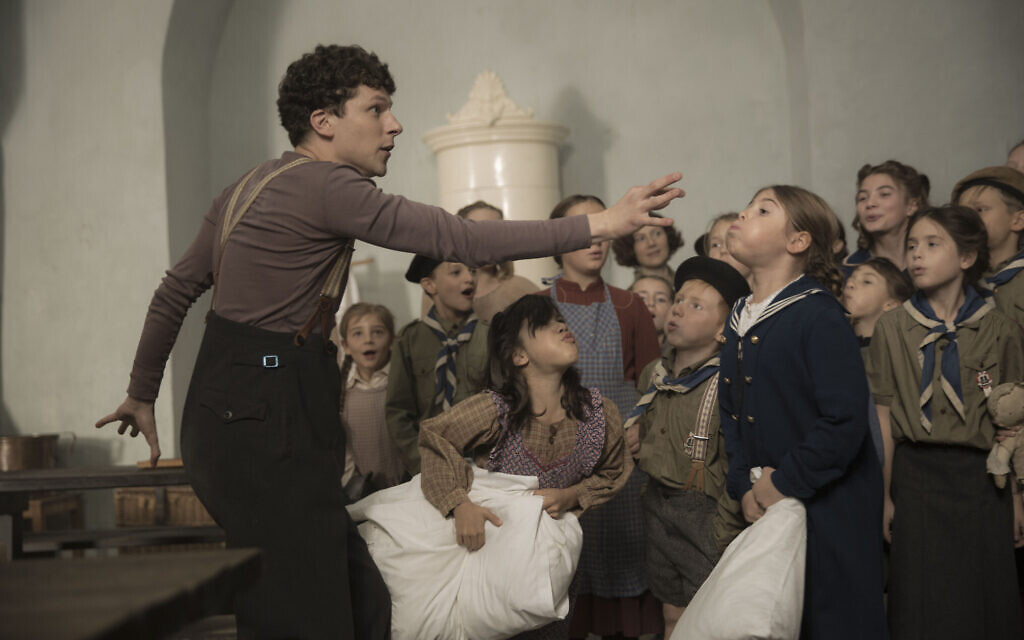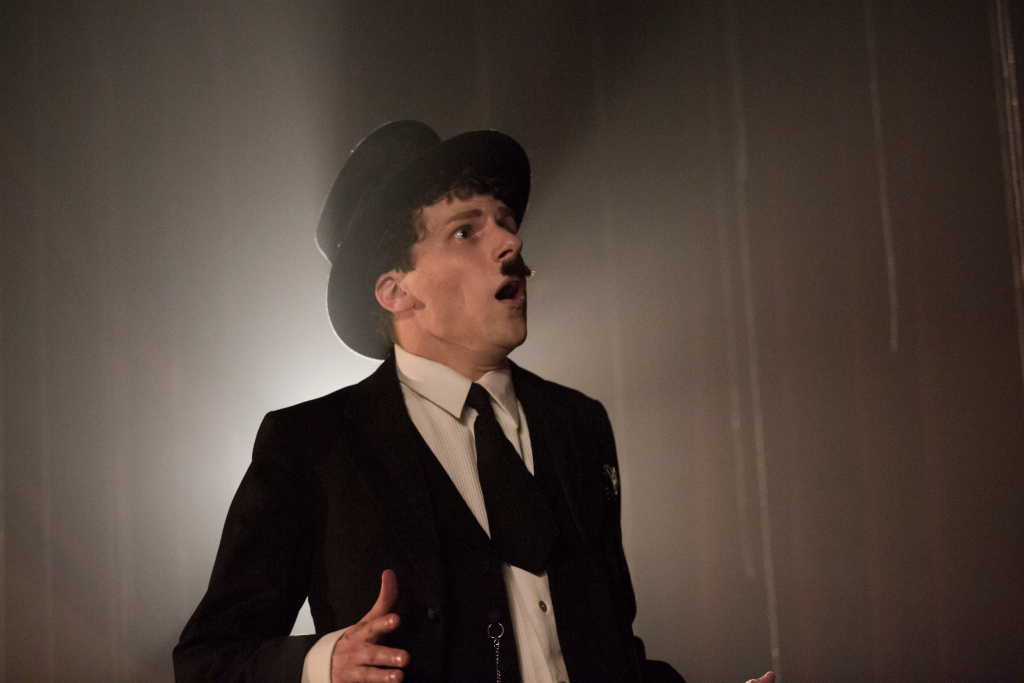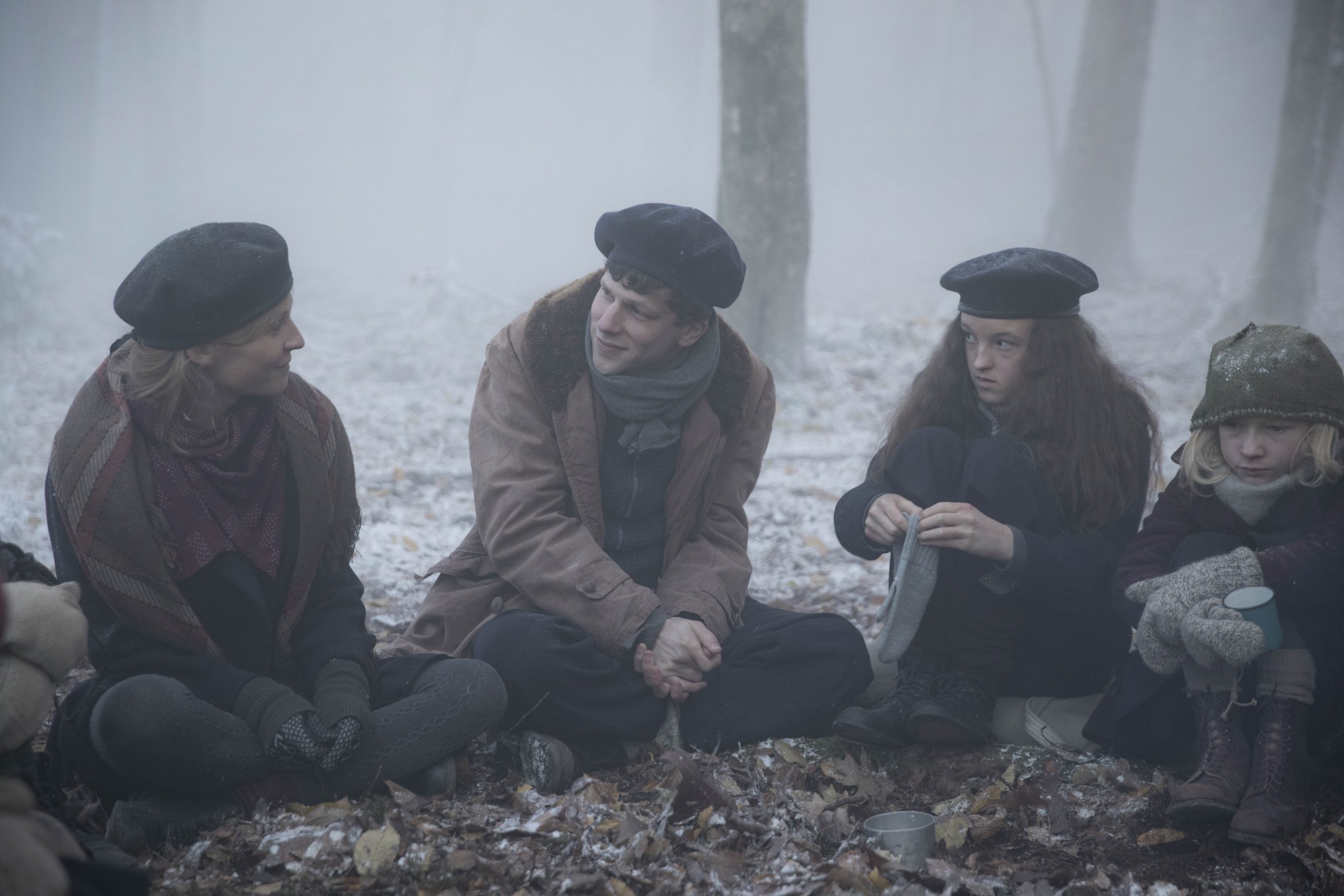In trying to decide whether a mediocre film is worthy of a marginal recommendation or a marginal pan, a critic will often consider the subject matter as a determining factor. This critic will, anyway. It feels cruel on some level to dislike a film that seriously considers a tragic period of human history, and is dedicated to those who fell victim to it. But just because a movie has important subject matter does not mean it was made with sufficient inspiration, originality or craft, and that’s the case with the new film that honours French resistance fighters in World War II.
It’s appropriate that Jonathan Jakubowicz’s Resistance centres on famed French mime Marcel Marceau in his early days with the resistance, as the film itself engages in a bit of mimicry. The character, played by Jesse Eisenberg, resembles other cinematic predecessors who tried to divert the attention of young children from the horrors before them – Robert Benigni in Life is Beautiful at best (and most contextually similar), Robin Williams in Patch Adams at worst. The whole film has a bit too much of a debt to Schindler’s List, perhaps the best film ever made on the subject of saving European Jews from Nazi extermination.
It’s the Patch Adams comparison that is most damning for Resistance. In that notably saccharine film, Williams’ title character donned a clown nose and made goofy faces to help kids forget for five minutes that they had cancer. Again, another well-meaning endeavour. Part of the problem was that you never really believed these children would be reduced to joyous guffaws by Williams’ antics, and here, Eisenberg’s Marceau does not really seem capable, using just a few goofy faces and pantomimes, of making a bunch of displaced Jewish orphans forget that the Nazis had killed their parents.
And yet it’s reasonable to assume that Marceau did actually perform this function, on some level, for some of these children, as he was already experimenting with mime before he became involved in the resistance movement. It’s just that the film depicts Marceau as capable of winning over a room full of children – and later, an audience full of soldiers – with the equivalent of some basic mime gag like “man trapped in an invisible box.” Eisenberg’s performance is just not up to convincing us of it. Or maybe, people just liked “man trapped in an invisible box” a lot more back then.
It’s these types of narrative conveniences, designed to simplify thornier issues for packaging within the context of a movie, that plague Resistance throughout. The film opens on its main child character, Elsbeth (Bella Ramsey), in her home in 1938. “Why do they hate us?” she asks her father after he finishes reading her a bedtime story. Literally five minutes after his explanation and tucking her in, Nazis storm into her house and take her parents into the street, where they are executed. The hand couldn’t be heavier.
Yet a review of what I have called a mediocre film should not concentrate only on the ways it fails, as it succeeds almost in equal measure. One of those ways is actually telling a story that many of us likely did not know, even if it’s larded up a bit for greater excitement and tension. We tend to think of the world of entertainment and the world of great wartime courage as being mutually exclusive, and maybe it sounds especially like the punchline of some joke to say that the world’s most famous mime spent some of his time punching out Nazis. There’s only one scene of that, actually – though he does also breathe fire on another Nazi after borrowing the necessary materials from a street performer.
The point is, it is indeed useful to learn the details of what Marceau, born Marcel Mangel to a long line of Jewish butchers, did to ferry hundreds of Jewish orphans to safety around Europe. Stories like this, when they do finally materialise on screen, prompt us to wonder why it took so long to tell them. Resistance follows Marceau from his days donning a Chaplin moustache in seedy Paris nightclubs – a moustache that led some to assume he was portraying Hitler – to his awakening to the horrors being perpetrated by the Fuehrer, to his willingness to put himself on the front lines of saving future victims from those horrors, while cloaking his own Jewish heritage from Nazi eyes. His brother Alain (Felix Moati) and a love interest, Emma (Clemence Poesy), are among his close confidantes in the resistance. Together, they helped deliver hundreds if not thousands of children to safe hiding spots around Europe.
Another historical figure portrayed in this film is on the side of the enemy. Klaus Barbie, known as the Butcher of Lyon, is played here with great scenery-chewing gusto by Matthias Schweighofer. In another typical example of the broad strokes in which Resistance is painted, Barbie is introduced to us in a scene where he beats to death a suspected homosexual in the middle of a party attended by members of the cultural and intellectual elite. We already know the guy is an evil monster, but Resistance is eager to make sure we understand just how evil.
It isn’t, or at least wasn’t once, a problem to tell a story in somewhat broad strokes, especially when you are trying to capture a significant amount of narrative within an epic historical sweep. It’s just that without anything really distinctive to recommend it, Resistance fails to stand out from the many films that have done this better in the past. If any story should continue to be re-told, it’s the plight of Jews during the Holocaust, as it will never be possible to witness that tragedy too much. Not every attempt to witness that tragedy is equal to every other attempt, though.
Resistance is playing in cinemas and is available on VOD.


